São Paulo, September 26, 2024 – With the aim of accelerating port and maritime decarbonization in Brazil, the UN Global Compact Brazil Network launches the first version of a guide for the sector, developed by the Ocean Business Working Group, linked to the Water and Ocean Action Platform, being the country’s first corporate hub created to boost the energy transition of ports and maritime transport. The launch, which is available online, offers a comprehensive view of global discussions around decarbonization in the port and maritime sector; highlights the main challenges of this agenda and explores the opportunities, especially for Brazil, which has the potential and resources to position itself strategically in this scenario.
The guide was presented at SDGs in Brazil 2024, the world’s largest Brazilian corporate sustainability event, on September 20, at the Delegates Dining Room, inside the UN headquarters in New York, by Fernanda Sossai, head of Port Development at Porto do Açu, a leading company in the WG.
The maritime transport sector plays a fundamental role in global trade and is a significant source of greenhouse gas (GHG) emissions, representing approximately 3% of global emissions, according to the International Maritime Organization (IMO). The IMO has established targets for reducing these emissions, with objectives to reduce them by 30% by 2030, 80% by 2040 and achieve net zero emissions by 2050. If mitigation measures are not adopted, emissions associated with maritime transport may increase between 50% and 250% by 2050. In Brazil, with a coastline of 7,367 km, the so-called sea economy accounts for around 19% to 21% of the national GDP (FGV, 2018). Furthermore, approximately 95% of Brazilian exports are carried out through maritime transport, according to data from the National Bank for Economic and Social Development (BNDES).
“The transition to a zero-emission economy in the maritime and port sector is not only an urgent environmental necessity, but also an opportunity to ensure a just and inclusive transformation. Although there are still many paths to be defined, with several fuel alternatives under study globally, we must be proactive, building solutions that are not only efficient, but also equitable, that is, distributed fairly, with special attention to the needs of different groups,” said Carlo Pereira, CEO of the UN Global Compact Brazil Network, who highlights: “The future of maritime transport in Brazil will be shaped by the decisions made today.”
The Guide is the result of more than a year of dedication from the Ocean Business Working Group, which was born in July 2023, with 60 participating companies and is part of the Ocean Stewardship Coalition agenda, conducted by the Global Compact’s ocean team, based in Norway, and will be managed by the Brazil Network. In 81 pages, the material lists the main challenges and opportunities for the sector, such as decarbonization ecosystems for ports and alternative fuels. “Brazil has explored several technological routes in search of alternative fuels for maritime transport, such as biodiesel and HVO, green diesel, ethanol and methanol. The choice of the best alternative will depend on the most variable factors, such as costs, energy density, available technologies, dangerousness, availability of supply infrastructure, application for different types of vessels and routes, among others,” explained Rubens Filho, executive manager of Environment of the Brazilian network of the Global Compact. “And each of the fuels must be analyzed in its advantages and disadvantages in performance and environmental impact, according to its use.”
“The port sector has an unprecedented opportunity to be the lever for improving the efficiency and sustainability of industries, in response to the challenges posed by climate change. Investing in sustainable technologies and practices, in the resilience of operations and in the adoption of renewable energy solutions will position ports as competitive means for the energy transition and in climate adaptation. By establishing ourselves as energy hubs, we, who are a port-industry, have a fundamental role in the transition of the maritime sector and for hard-to-abate industrial sectors,” highlighted Eugenio Figueiredo, CEO of Porto do Açu.
The Guide also features national and international cases, a recommendations notebook and an analysis of decarbonization on the government agenda. The UN Global Compact Brazil Network wants to expand the WG to build joint solutions and exchanges of experiences between the actors involved in the maritime and port industry. The aim is to provide a space for pilot projects and innovations to occur.
SDGs in Brazil 2024 was sponsored by Banco do Brasil and the Federal Government; support from Aegea, Ambipar, Apex Brasil together with the Ministry of Development, Industry, Trade and Services and the Federal Government; and EY. Partners: Marfrig BRF and Flytour; Institutional partnership of AMCHAM, Brazil Foundation, Global Citizen, IBGC, ICC and Lide NYC; Media partner: Exame.
About the UN Global Compact Brazil Network
As a special initiative of the UN Secretary-General, the United Nations Global Compact is a call for companies around the world to align their operations and strategies with ten universal principles in the areas of human rights, labor, environment and anti-corruption. Launched in 2000, the Global Compact guides and supports the global business community in advancing UN goals and values through responsible corporate practices. It has more than 20,000 participants distributed across 62 networks covering 77 countries, being the largest corporate sustainability initiative in the world. There are also 5 Hubs in different regions of the world and 14 regional managers responsible for the implementation process in more than 20 countries. For more information, follow @globalcompact on social media and visit our website at www.unglobalcompact.org
The UN Global Compact Brazil Network was created in 2003 and is today the second largest local network in the world, with more than 2,000 participants. The more than 50 projects conducted in the country mainly cover the following themes: Water, Food and Agriculture, Energy and Climate, Human Rights and Labor, Anti-Corruption, Engagement and Communication. For more information, follow @pactoglobalonubr on social media and visit our website at www.pactoglobal.org.br
